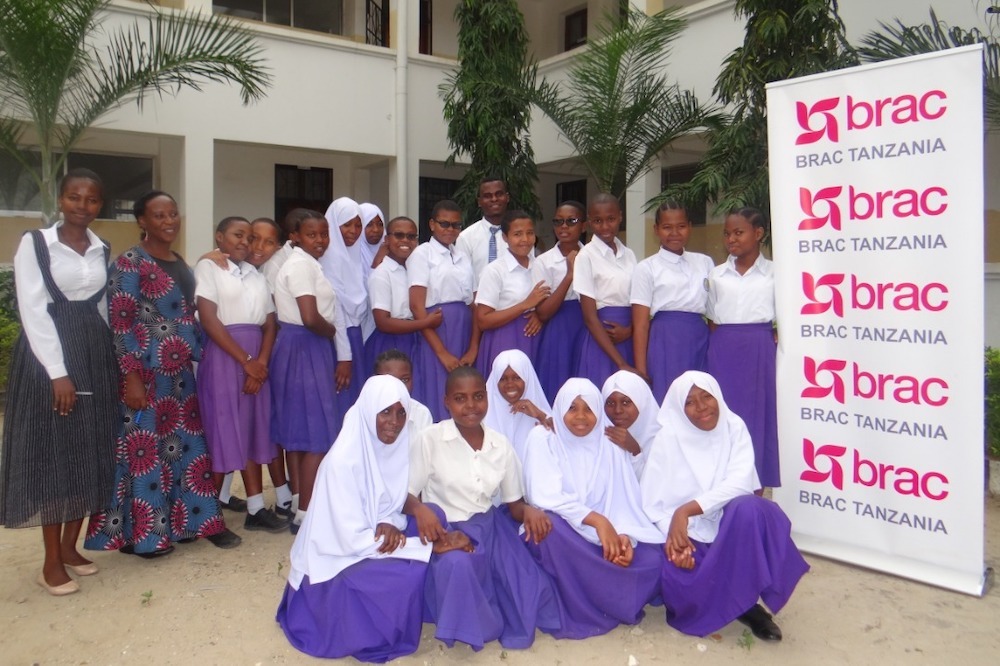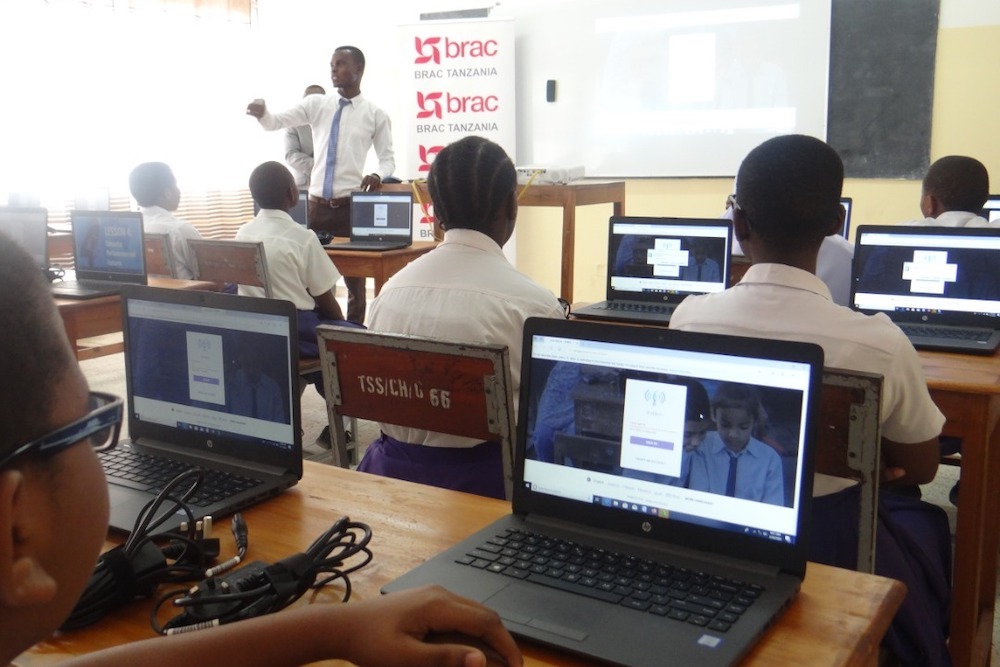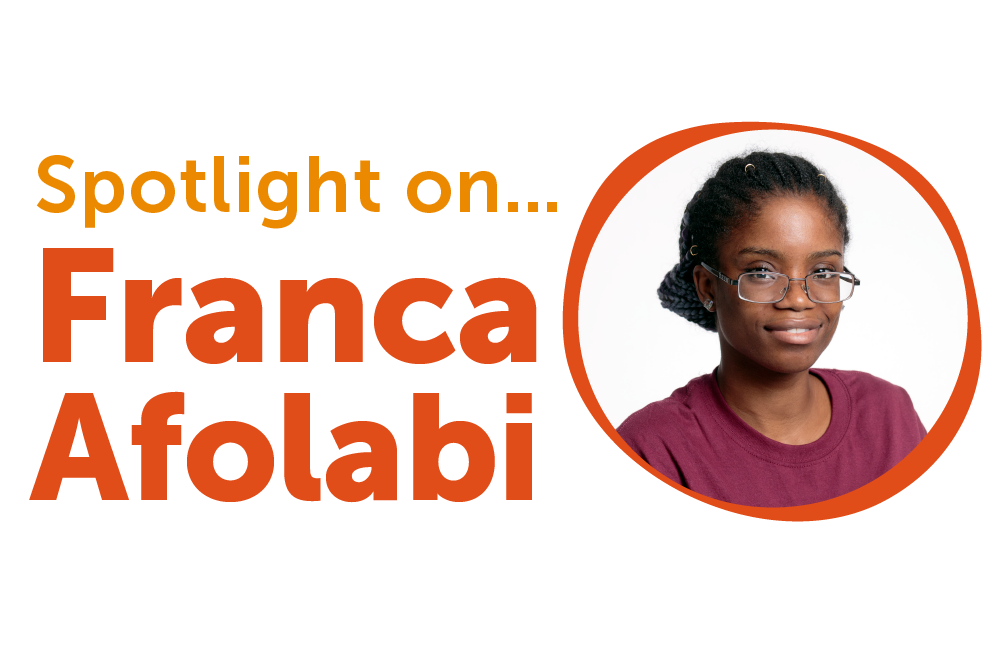
“Girls can become unstoppable if they have digital skills”

Spotlight On ..., Technology and education
Lemmy Lucian - a technology officer with Theirworld’s partner BRAC Tanzania - talks about ensuring girls and young women have equal access to the skills they need for future work.
As technology skills become even more crucial in the future workplace, girls and young women in many parts of the world face being marginalised and left behind.
Theirworld’s Skills for their Future programme aims to empower and unlock opportunity – providing girls aged 14 to 20 with digital, coding and entrepreneurship skills.
One of our projects is in Tanzania, where we work in partnership with the development organisation BRAC Tanzania. In the latest in our Spotlight On … series, which features inspiring people from the world of education, we talk to Lemmy Lucian, a 27-year-old ICT Officer for the Skills for Their Future project.
He talks about his own background, his work to end the digital divide and how BRAC Tanzania reacted to the challenges of the pandemic.
Tell us about your journey to become part of the Skills for the Future programme
It started in 2019, when I graduated with my bachelor’s degree from the Institute of Finance Management in Dar es Salaam. While I was in university, I realised there is a huge digital divide in Tanzania between women and men. I made a simple survey in class and found most girls didn’t have a good foundation in technology from primary to secondary school level. Rather they came across to digital devices when they were in universities.
I believe that technology plays a huge role in any field of study, so I have been encouraging the younger students to learn technology for a better future career.
In 2019 I applied for the job at BRAC Maendeleo Tanzania. Thank God, I got the position and was introduced to Theirworld. It was not easy since I was fresh from school. I was introduced to the work of providing training on digital skills to girls. My passion – helping the young generation acquire digital education that will impact their life – had come true.
From there, I have been teaching girls digital skills while ensuring competency and ability to use in their future career. I have also been opening their minds on how technology can help them with more opportunities. I hope that a generation will get access to technology through the Skills for their Future project in the coming years – and that when they get admission to university, the digital divide will no longer exist for them.

Why is the Skills for their Future programme so important?
It helps to reduce the existing digital divide in Tanzania. This impact will be realised in the future, as any person without digital skills will not be able to compete. Women could be affected more, as they are prone to stigmatising behaviour in Tanzania. This project creates a future for women in the tech industry and other professional areas. Priority will be given to girls who are digitally equipped.
This project supports the government directly in helping students to acquire the essential digital skills needed in a world where every task is being automated and made available online. The Tanzanian government has been providing ICT skills to some secondary schools and at higher-level learning.
However, the number of schools and students getting these skills is still low compared to the actual need. This shows that the government still needs to be supported in helping schools to offer digital skills in their curriculums, as well as creating proper infrastructure for the digital classes and digital teaching process.
How has the pandemic impacted your work in the district of Temeke, Dar es Salaam?
When the pandemic came all the schools were closed. It became difficult for girls to learn and the Skills for their Future project was about to stop. The government restricted all kinds of unnecessary gatherings and even prohibited any family visits or movement.
This forced us to change the mode of delivering our digital literacy training to the girls. BRAC and Theirworld provided tablets to the girls for learning while they were at home. I used the tablets to conduct online sessions via Zoom and Google Classroom. This supported young girls to have access to both digital skills and their school subjects. I installed the tablets with various learning applications such as Shule Direct and Msomi Bora, as well as digital literacy content.
Also, I started to deliver awareness on the pandemic to communities – to ensure that when the schools opened all the students would be able to return without losing any member of the programme. I had a chance to visit all the family members and the students in their homes with flyers, providing awareness on the pandemic and how they could ensure safety for themselves and their loved ones.
What keeps you motivated when challenges seem too large to overcome?
I was frustrated with the situation during the pandemic. I was afraid to use public transport to visit the project members, as they live in scattered areas where I needed to travel for a very long time. It was really terrible to me. I was in the frontline, doing the best I could to protect the members of the project and their families from the pandemic by giving all the necessary information for them to be safe.
Sometimes I felt like giving up on working in this vulnerable environment. But BRAC Maendeleo Tanzania played a great role in providing the personal protective equipment, training on the pandemic and mental health support during those very tough moments. This kept me believing that together as a team we could win against these difficult circumstances and then move into better times together with Theirworld, BRAC and Skills for their Future beneficiaries.

Lemmy Lucian helps students learn the digital skills they will need for future jobs
What achievements are you most proud of?
Despite having these tough moments, I worked hard to ensure the main objectives of the project were delivered with the best output. When the schools reopened, I worked hard to train the girls on digital skills – setting various teaching approaches that made them engaged with the course and passionate to learn.
We created a very competent class of girls who are well equipped in technology. This class changed everyone’s perception in the school community. These girls became the digital ambassadors for the school and every student wished to be enrolled in this project.
I have received appreciation from the parents and community leaders on how we transformed their minds about girls in technology. They have been appreciating BRAC and Theirworld for providing this revolutionary project in these times.
I feel proud, as I have created something positive in someone’s life that will not be forgotten for many years. This is what I love to do in my life.
What lessons have you learnt outside the classroom – and what would you pass on to the students?
Passion and resilience are the key drivers for the fulfilment of any goal in life. These have shaped me, through commitment and working hard while believing that every situation has an end – if not today perhaps it will be tomorrow.
The lesson that I would like to share with students is that education is not about accumulating certificates and completing certain levels. It’s the ability to transform the acquired skills during the learning process into the world of work. This can be achieved only if they have passion for what they study and resilience to keep learning and ensure they absorb several sets of skills.
What are your hopes for the future of the programme?
I hope it will be a transformative campaign in Tanzanian schools, as well as in the whole world. This programme does not only equip girls and young women with digital skills but also it breaks the roots of gender stereotyping that restrict access to technology for girls and young women in the community.
The programme speaks on behalf of the girls and young women all over the world – to ensure all girls are getting equal access to technology. Girls can become unstoppable if they have digital skills.
Theirworld’s work with BRAC Tanzania is made possible by the players of People’s Postcode Lottery UK.
More news

